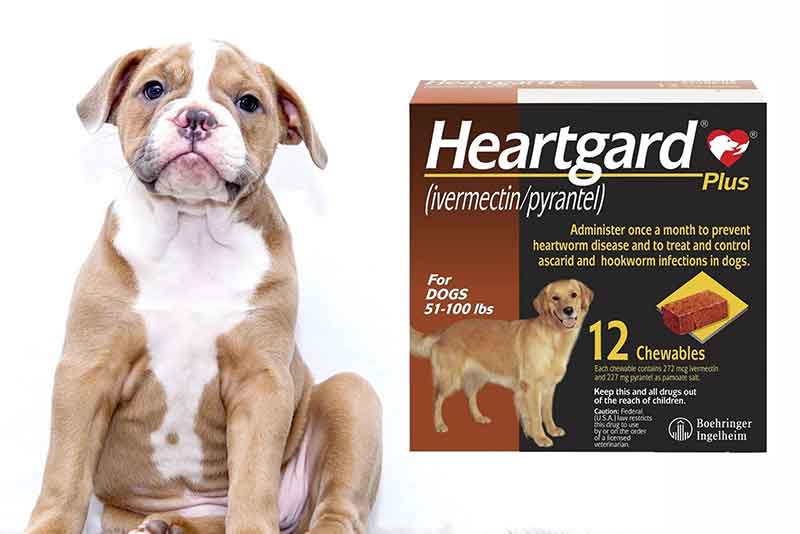Can I Give My Dog A Lower/Higher Dose Of Heartgard? Explained
Attention, dog owners! Today we will be talking about an important subject matter that all dog owners should know. It is not bizarre that a dog would face health complications for several reasons.
However, as we always say, prevention is better than cure; dog owners can take basic precautions to ensure that their pet’s health is not in danger. Heart-worms, scientifically known as Dirofilaria immitis, is a common health concern among dogs.
This is a preventable disease, yet not taking quick action could result in severe consequences.
Heartgard is the primary deterrent of heartworm disease. This article will answer one of the frequently raised questions by dog owners regarding the usage of Heartgard.
So, can you give your dog a lower or higher dose of Heartgard? If you are concerned about giving your dog a lower/higher dose of Heartgard, the answer primarily depends on your dog’s weight. In general, it is always safer to give the recommended dose than giving a lower or a higher one. Refer to the table below to get a clear understanding of the Heartgard dose that you should give to your dog.
| Dog’s weight | Tablets per month | Ivermectin per tablet | Color on carton |
| Up to 25 lb | 1 | 68 mcg | Blue |
| 26 to 50 lb | 1 | 136 mcg | Green |
| 51 to 100 lb | 1 | 272 mcg | Brown |
Heartworm is a disease that spreads from parasites and is transmitted to dogs via infected mosquitos. Heartgard is a veterinary recommended medication that helps prevent heartworm disease in your dog.
So now, let’s elaboratively look at the facts you should be familiar with when giving your dog Heartgard.
Heartgard for dogs and small dogs
As mentioned before, your dog’s weight is a crucial determinant when deciding the required Heartgard dosage to give. This medication comes in two forms, namely, Heartgard and Heartgard Plus.
The key ingredient in Heartgard is ivermectin, whereas Heartgard Plus includes ivermectin as well as pyrantel. Nonetheless, both can be used to prevent the disease.
It is proven that Heartgard is an effective medication in preventing heartworms. Still, when you are giving Heartgard to your dog, you must be mindful about giving them the correct dose.
As you can see in the above table, Heartgard tablets come in three different sizes aiming at three weight categories; basically for large-sized, medium-sized, and small-sized dogs.
The dosage gets higher depending on the weight of your dog. So you have to select a suitable dose considering your dog’s weight.
Some may bother if it is convenient to give Heartgard to small dogs. It is fine to provide the recommended dose of Heartgard to them. The dogs with an average weight range of up to 25 pounds (approximately 11.5 kg) belong to the category of small dogs.
Therefore, you can give them a 68 mcg ivermectin Heartgard dose or a 68 mcg ivermectin and a 57 mg pyrantel Heartgard Plus dose. On the other hand, if your dog weighs over 100 pounds (approximately 45.5 kg), it is advisable to consult a vet and decide what dose to give them.
However, according to vets, the approved dosage is 2.72 mcg of ivermectin and 2.27 mg of pyrantel per pound. Furthermore, Heartgard is recommended for dogs above six weeks, and you can give it to your dog at monthly intervals.
Can I give my dog a lower dose of Heartgard?
Heartgard is the best solution to ensure that you keep your dog free from heartworms. However, when the dog owners do not have a clear understanding of this medicine, they might be reluctant to give it to their dog.
Most probably, they will tend to provide a lower dose considering that it may have fewer side effects or so. Even some dog owners may buy lower doses because they are relatively cheap.
Previously we discussed three weight categories and what doses to give in each. However, if you think of giving your dog a lower dose than the recommended one, that might not be the smartest thing to do.
According to veterinarians, it is essential to give an accurate dose depending on your dog’s weight. Providing a lower dose doesn’t do any good to the dog; instead, it will reduce the medication’s efficiency.
Can I give my dog a higher dose of Heartgard?
Now you are aware that you should not underdose your dog. How about overdosing? In other words, giving your dog a higher dose of Heartgard than the recommended one?
If you think that giving a higher dose of Heartgard would increase the potency of not getting heartworms, you aren’t necessarily correct. This drug certainly avoids dogs getting infected with heartworms, but giving a higher dose doesn’t intensify its efficiency.
Heartgard, just like many other medical drugs, causes some side effects. Providing a higher dose of Heartgard instead of the recommended dose could potentially create more complications than usual.
So it’s advisable not to give higher doses. But there are some exceptions too. In some cases, you may have to give higher doses with the weight changes of your dog and how they react to the drug.
If you feel like your dog needs a higher dose, it is better to get advice from a vet and then gradually increase the dose.
Can I give my dog Heartgard while on antibiotics?
If your dog is on antibiotics, you may struggle thinking whether you should give them Heartgard at the same time.
Well, suppose your dog is already taking some sort of antibiotics for a health condition. In that case, you must get advice from a vet on whether to give or not to give Heartgard. Sometimes, having multiple medicines together may react negatively.
The active ingredients of Heartgard and Heartgard Plus are ivermectin and pyrantel. Some antibiotics could interact wrong if they merge with ivermectin and pyrantel. Below you can find some examples.
- Erythromycin: is an antibiotic that is used for dogs to treat bacterial infections, skin infections, and wounds.
- Immunosuppressive medications: are mainly used in treating immune-related health concerns. Some of the commonly used immunosuppressive drugs are cyclosporine, azathioprine, leflunomide.
- Blood pressure medications: amlodipine besylate, nifedipine, and diuretics are some common medications used to treat high blood pressure levels in dogs.
- Anti-fungal medications: as the name implies, anti-fungal drugs help treat fungal infections in dogs. Anti-fungal medicines such as ketoconazole, itraconazole, Fluconazole, and Voriconazole are some of the common ones.
- Intestinal deworming medications: levamisole, morantel, and piperazine are used in treating intestinal worms, such as hookworms and roundworms.
These are some common medical drugs that you should not mix with Heartgard. There could be more as well. Therefore if your dog is already on antibiotics, it is better to provide Heartgard under medical supervision unless you have sound knowledge of the medicines.
How long do Heartgard side effects last?
The active ingredients of Heartgard could have some side effects on your dog. Not all dogs face exact side effects; they may differ from one to the other. Some dog breeds could be more vulnerable to these side effects than others.
However, overall your dog may indicate side effects such as vomiting, nausea, weight loss, fatigue, and drooling. If the dog is extremely sensitive towards the medicine, it may show some complex side effects, including Diarrhea, seizures, and even sudden blindness.
Usually, such side effects will start to indicate 12 hours after taking the medication, and it will be there on and off until 2 to 3 days. Symptoms tend to be more intense on the first day, and they will gradually decrease in the next couple of days.
After 72 hours, your dog will come back to normal condition. If you notice side effects even after that period, you better take the dog to a vet without hesitating.
Final thoughts
Today, we mainly talked about whether it is suitable to give your dog a lower or a higher dose of Heartgard. As we discussed throughout the article, Heartgard is a highly effective drug that helps to prevent your dog from heartworms.
If you own a dog, you cannot deny that you have some mandatory duties to fulfill. And paying attention to your pet’s health is on the top of the list. In order to do that, you should take preventive mechanisms, and it reduces the threat of health concerns in your dog to a greater extent.
When providing Heartgard to your canine, one of the major concerns that pop up is what dosage to use. As we thoroughly discussed, it is always better to give the dose allocated to your dog’s weight range.
There could be specific scenarios where you have to give them a lower or a higher dose; however, unless a veterinary ask you to do so, make sure you stick with the recommended dose.
Providing the correct dose of Heartgard under proper guidance would not cause any harm to your dog’s health, and yes, it will undoubtedly help to reduce the risk of heartworms.
Thank you for reading this post. Stay tuned with Jack Russell Owner for more interesting posts. Cheers from Shaggy and Lenny!





![Can Dogs Get Cavities? Yes [What To Do & Cost To Fix]](https://jackrussellowner.com/wp-content/uploads/2023/11/Can-Dogs-Get-Cavities-Yes-What-To-Do-Cost-To-Fix-768x575.jpg)


